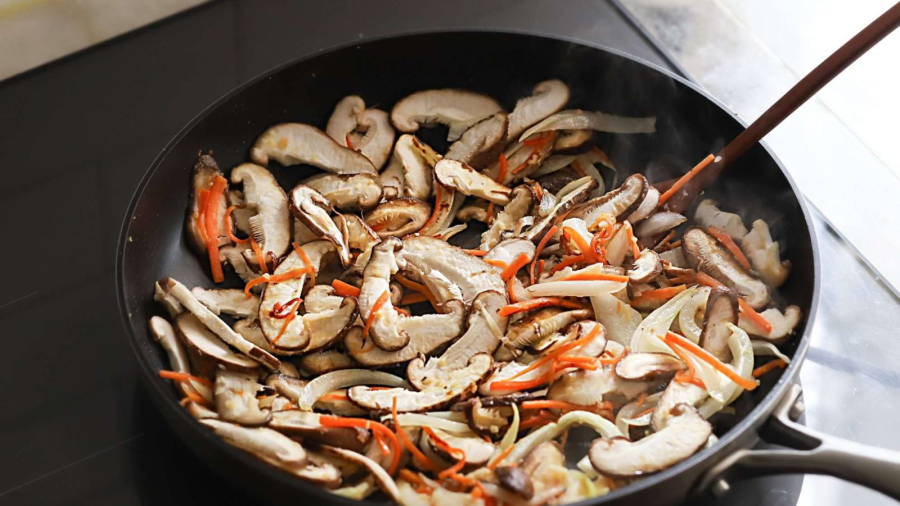Why You Shouldn’t Keep Seafood Overnight
Seafood is highly perishable and prone to rapid spoilage, especially when left at room temperature. Bacteria can quickly proliferate on seafood, even after it’s been cooked. Consuming seafood that’s been kept overnight increases the risk of food poisoning, with potential symptoms including nausea, vomiting, diarrhea, and abdominal pain.
While seafood offers a rich source of nutrients such as protein, omega-3 fatty acids, and various vitamins and minerals, the nutritional value diminishes when it’s kept overnight. Certain types of seafood, like shellfish, may also contain natural toxins that can proliferate over time, posing a potential health hazard if consumed.

Overnight storage of seafood can lead to a decline in nutrient content.
Why You Shouldn’t Keep Green Vegetables Overnight
Green vegetables are rich in nitrates, which can be converted by bacteria into nitrites—a compound that poses a risk of poisoning, especially for children. Additionally, nitrites can form nitrosamines, known carcinogens. Vegetables kept overnight also risk bacterial and mold contamination, further increasing the chances of food poisoning.
Green vegetables are packed with vitamins and minerals, but these break down over time, particularly vitamin C. Overnight storage causes them to lose their crispness and freshness, impacting both their flavor and nutritional value. For optimal health, it’s best to consume green vegetables soon after preparation and avoid keeping them overnight, even in the refrigerator.

Overnight storage affects the crispness and freshness of green vegetables.
Why You Shouldn’t Keep Hard-Boiled Eggs Overnight
Even cooked eggs can harbor Salmonella bacteria. Leaving boiled eggs at room temperature provides an ideal environment for bacterial growth, leading to an increased risk of food poisoning. Symptoms of Salmonella poisoning include diarrhea, fever, abdominal cramps, and vomiting.
To ensure food safety, it’s best to consume boiled eggs soon after cooking and avoid keeping them overnight, even when refrigerated. If you must store cooked eggs, promptly cool them and keep them in the refrigerator at a temperature below 4°C.
Why You Shouldn’t Keep Cooked Mushrooms Overnight
Mushrooms have a porous structure that easily absorbs water and nutrients, creating a favorable environment for bacterial growth. Leaving cooked mushrooms at room temperature overnight can lead to rapid bacterial proliferation and an increased risk of food poisoning.
Additionally, mushrooms contain nitrates, which can be converted into nitrites—compounds that may pose health risks, especially for children. Nitrites can cause respiratory issues and affect oxygen transport in the blood.
For these reasons, it’s best to consume mushrooms soon after cooking and avoid keeping them overnight, even when stored in the refrigerator.

Enjoy mushrooms fresh and avoid keeping them overnight for food safety.
Why You Shouldn’t Keep Greasy Food Overnight
Greasy foods provide an ideal environment for bacterial growth. When kept overnight, especially at room temperature, bacteria can quickly multiply on the surface and within the food, leading to spoilage. Consuming fried foods that have been kept overnight increases the risk of food poisoning, with potential symptoms including nausea, vomiting, diarrhea, and abdominal cramps.
Additionally, regularly consuming greasy foods that have been kept overnight can contribute to the development of chronic health conditions, such as obesity, diabetes, cardiovascular disease, and certain types of cancer. This is due to the high content of saturated fat and cholesterol in greasy foods, which can elevate harmful cholesterol levels in the blood and damage the vascular system.
Tips for Perfectly Boiled Eggs Every Time
Warning: 7 Potential Risks of Not Shutting Your Fridge Door that Can Result in Energy Loss
Do you ever forget to close your refrigerator door fully? If so, you should consider the consequences of this careless action. Read on to find out the potential problems that could arise when the refrigerator door isn’t shut securely, such as energy waste, a decrease in food freshness, and potential pest invasions. Learn why it’s essential to make sure your fridge door always stays tightly shut!





































